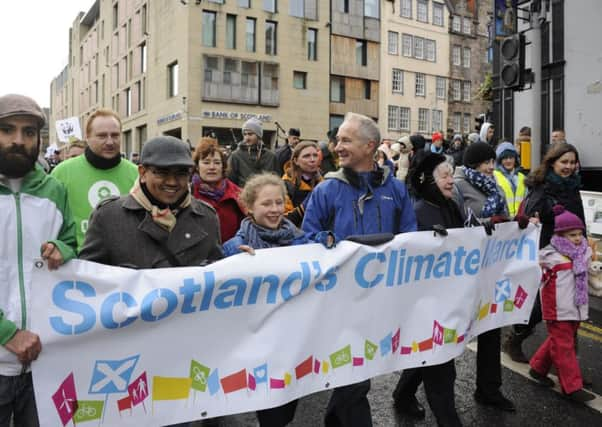Sam Gardner: Fine words on climate change but no solid funding


In December, international media focused on Paris as world leaders gathered to hammer out a new international climate agreement. The First Minister was there to set out Scotland’s climate story so far and share the ambition of our Climate Change Act. With more than 180 nations making pledges to limit their climate emissions, the final agreement broke new ground, creating a new level of ambition to limit the rise in temperatures to 1.5C and showcasing transformative plans to scale-up the deployment of renewables across India and African nations.
While the Paris agreement is far from a job done, it provided a clear indication that the international community is finally ready to get down to the business of tackling climate change. Countries around the world are investing for the future with progressive climate policies and major spending commitments on clean energy – as US vice-president Joe Biden said: “Show me your budget, and I’ll tell you what you value.”
Advertisement
Hide AdAdvertisement
Hide AdFor Scotland to be at the forefront of the global low carbon transition that is under way, the Scottish Government will have to take clear policy and spending decisions too.
In the run-up to the negotiations, Scottish ministers committed to embedding climate change in the Draft Budget for 2016-17. However, mere days after the Paris talks concluded, the Scottish Government cut funding for climate action in this Draft Budget. The Scottish Government’s own figures show planned spending on reducing climate emissions for 2016-17 is almost 10 per cent less than the previous year.
But as the Budget is finalised over the next few weeks, there is still time to fix that. Fortunately, the Scottish Government shouldn’t have to look far for good ideas. Investment in improving the energy efficiency of people’s homes makes sense on many levels – it helps the 845,000 households in Scotland currently in fuel poverty, it can create thousands of jobs and it helps protect the frail, sick and elderly at risk of increased ill-health during the cold winter months.
But it’s also good for tackling climate change. Close to half of Scotland’s climate change emissions come from heating our homes, workplaces and hot water. Yet the Scottish Government Draft Budget cuts investment in fuel poverty and energy efficiency by 13 per cent in the very year that its commitment to eradicate fuel poverty falls due.
With the Scottish Government having announced that it is introducing a long-term, transformative approach to improving energy efficiency, and the clear economic, environmental and social benefits such an approach could bring to all parts of Scotland, this should be an area that is seeing increased funding.
The Scottish Government’s own independent advisors, the UK Committee on Climate Change, advised last March that Scotland needed to increase investment in existing policies or commit to new programmes to cut emissions.
Yet this Draft Budget doesn’t yet reflect that advice, nor does it prioritise action on climate change at the level required by the letter of Scotland’s Climate Change Act or the spirit of the Paris Agreement.
The Scottish Government’s capital investments are particularly important. The investments made now in big infrastructure projects will still be with us in 50 years’ time, so it is vital that they are low-carbon.
Advertisement
Hide AdAdvertisement
Hide AdWith the Holyrood elections looming, all of Scotland’s political parties should be thinking about the actions they would take in government to tackle climate change.
All parties rightly value, and are proud of, Scotland’s world-leading climate legislation. A key commitment that Scotland’s political parties could be making as they put together their manifestos is a promise that each of their capital budgets over the course of the next Parliament will be consistent with the Climate Change Act.
As the Scottish Government finalises its Budget, and as all parties put forward how they will embed the Climate Act in their spending plans, there’s an opportunity to show us what they really value.
• Dr Sam Gardner is head of policy at WWF Scotland